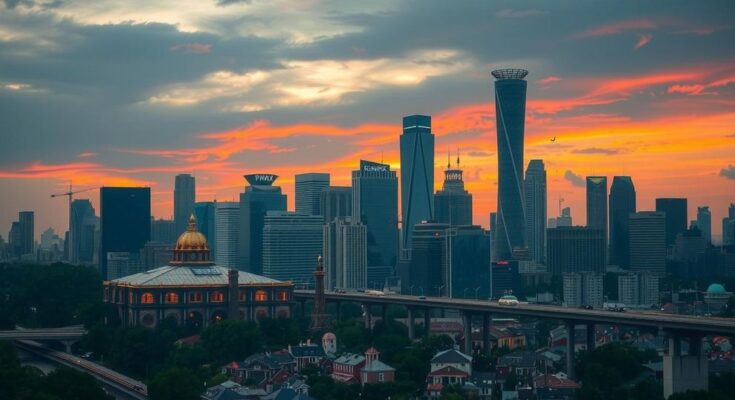Cities are crucial in combating climate change, responsible for 70% of global emissions. The World Urban Forum (WUF12) focused on strategies for sustainable urban development, highlighting Tokyo’s innovative initiatives like flood management and energy transition. The forum underscored the importance of technology and public-private partnerships in creating resilient cities, emphasizing a need for large-scale and localized solutions to tackle the climate crisis and ensure equitable access to resources.
Cities are increasingly critical in the battle against climate change, driving 70% of global greenhouse gas emissions and accounting for over 80% of the world’s GDP. With urban populations expected to swell from 50% to 70% by 2050—adding approximately 2.2 billion residents—the urgency for sustainable urban development is paramount. The recent World Urban Forum (WUF12), hosted by UN-Habitat, provided a platform for over 30,000 participants from 182 nations to devise actionable strategies for creating cleaner, more inclusive urban environments. As Anacláudia Rossbach, Executive Director of UN-Habitat, articulated, “Imagine a city that breathes—where green spaces weave through urban grids, air quality is no longer a privilege, and every individual has a secure, affordable place to call home.”
As cities grapple with the dual challenges of climate change and rapid population growth, they encounter significant hurdles such as deteriorating air quality and rising temperatures affecting urban ecosystems. The frequency of extreme weather phenomena, like the recent tornadoes in Valencia, highlights the urgent need for resilient infrastructure. Additionally, cities face escalating costs related to disaster response and infrastructure repairs. However, WUF12 discussions illuminated the potential for innovation and urban transformation amid these challenges.
Tokyo is exemplified as a leader in climate resilience and decarbonization. Governor Yuriko Koike emphasized this goal: “Faced with the crisis that is climate change, we will create a sustainable city model from Tokyo, a major energy consumer.” The TOKYO Resilience Project is a key initiative that includes advanced flood management systems and plans for substantial underground reservoirs to mitigate flooding caused by increased rainfall. Koike further stated, “We will also undertake the project of developing underground rivers which connect a number of underground regulating reservoirs and channel water there to Tokyo Bay.”
In terms of energy transition, Tokyo is pioneering mandatory rooftop solar energy installations for new buildings, complemented by government incentives aiming to triple solar capacity. Innovations, such as vertically installed solar panels on skyscrapers, represent Tokyo’s commitment to energy sustainability, alongside the electrification of public transport. Governor Koike noted, “This fiscal year, Tokyo has doubled its budget related to hydrogen energy, and is taking measures from the three perspectives of ‘producing,’ ‘transporting,’ and ‘utilizing’ hydrogen.”
The WUF12 also highlighted the power of technology in urban planning. Initiatives harnessing artificial intelligence and the Internet of Things are being deployed to enhance air quality monitoring, waste management, and energy optimization. Projects like SusHi Tech Tokyo 2024 illustrate the city’s role in fostering climate-focused innovation through collaboration among startups and urban leaders. Rossbach emphasized that these advancements should prioritize human needs, stating, “Smart cities are not just about efficiency—they are about equity, accessibility, and resilience.”
Public-private partnerships emerged as integral to sustainable urban development at WUF12. Tokyo’s Energy Generation and Storage Promotion Fund exemplifies such collaborative efforts, blending funding and expertise to enhance renewable energy and green infrastructure. Governor Koike remarked, “We will reinvigorate sustainable financing through various initiatives including supporting the issuance of SDG bonds in the private sector and helping expand the asset management industry.” Rossbach added, “When we speak of partnership, it is not just a concept but a call for action.”
WUF12 encapsulated the urgent need for cities to adopt large-scale and localized approaches to sustainability. Efforts ranging from solar panel installations to community-led housing initiatives demonstrate the vast array of solutions available. As Governor Koike warned, “The climate crisis is intensifying, so much so that some people say the age of ‘global boiling’ has arrived.” It is imperative for cities to spearhead decarbonization initiatives, as they are uniquely positioned to influence the lives of citizens positively.
In conclusion, forums such as WUF12 play a pivotal role in fostering collaboration and innovation as cities navigate the complexities of climate change, urbanization, and resource limitations. Given their capacity for transformative change, cities must embrace their role as leaders in advancing the global transition toward a sustainable economy. As Anacláudia Rossbach stated, “From ensuring affordable housing to advancing renewable energy, we need to foster collaborations that prioritize human well-being over profit and sustainability over convenience.”
As urbanization continues to rise globally, cities are recognized not only as economic powerhouses but also as critical battlegrounds in the fight against climate change. Urban areas, home to a significant portion of the world’s population, play a substantial role in greenhouse gas emissions and resource consumption. The challenges posed by climate change necessitate urgent attention to urban sustainability and resilience, as cities are pressured to evolve rapidly while mitigating their environmental impacts. Major conferences like the World Urban Forum serve to unite global leaders in developing actionable strategies for sustainable urban living.
The challenges and opportunities presented during the World Urban Forum underline the critical importance of urban areas in the climate change discourse. Cities like Tokyo exemplify proactive strategies aimed at fostering sustainability through innovative solutions and collaborations. As cities navigate their future amidst mounting climate pressures, their unique potential to lead global efforts toward a green economy cannot be overstated. Emphasizing equitable solutions and prioritizing human well-being over profit will be essential in this transformation towards sustainable urban environments.
Original Source: www.forbes.com




